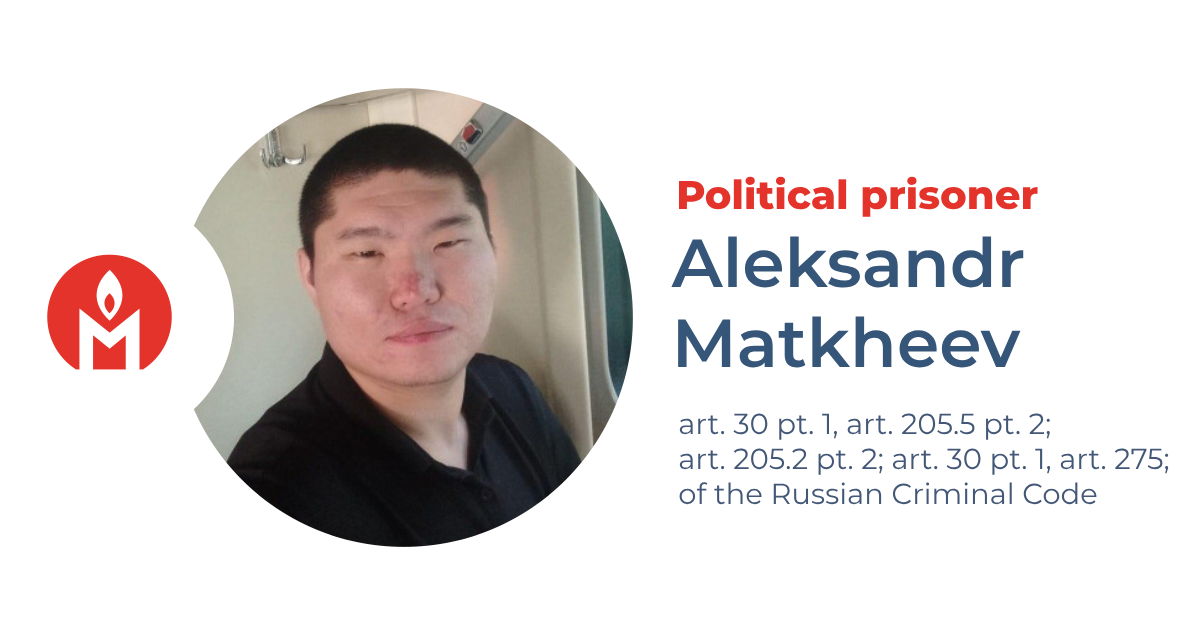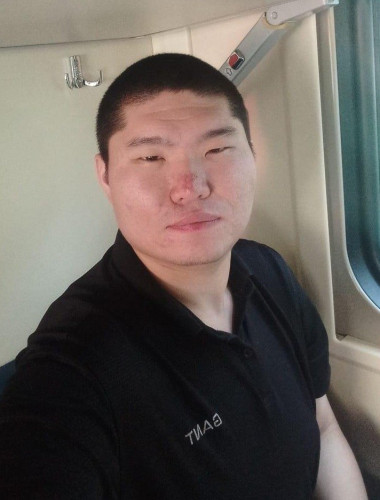Aleksandr Matkheev is a political prisoner
A resident of Irkutsk Oblast with a mental disability has been sentenced to 10 years’ imprisonment, probably as a result of an FSB provocation
The ‘Political Prisoners. Memorial’ human rights project, in accordance with international standards, considers Aleksandr Matkheev a political prisoner. Matkheev was convicted of preparing to commit treason, preparing to participate in a terrorist organisation, and promoting terrorism online, for attempting to join the Free Russia Legion and for a post about the Legion on the VK social media site. Matkheev’s prosecution violated his rights to freedom of expression and a fair trial. We demand the immediate release of Aleksandr Matkheev and that all criminal charges against him be dropped.

What were the charges against Aleksandr Matkheev?
Aleksandr Matkheev was born in Ulan-Ude and later moved with his mother and sister to Irkutsk Oblast to escape domestic violence perpetrated by his father. He was diagnosed with a mild mental disability, was registered at a psychiatric outpatient clinic, and struggled to find work.
According to the investigative authorities, in the autumn of 2022 Matkheev submitted an application to join the Free Russia Legion and began communicating with individuals allegedly representing that group.
On 24 February 2023, Matkheev posted an image on VK showing the Legion’s flag and emblem with the caption: ‘Victory to Ukraine, Freedom to Russia, Ukraine is the Will of the People, Freedom to Russia.’
Following instructions supposedly given by representatives of the Legion, he allegedly bought combat gear and travelled to Kazakhstan, where he planned to approach the Ukrainian embassy. However, on 11 November 2023 he was detained en route by FSB officers. Matkheev was charged with preparing to commit treason (Article 30, Part 1, in conjunction of Article 275 of the Russian Criminal Code), preparing to participate in a terrorist organisation (Article 30, Part 1, in conjunction with Article 205.5, Part 2) and promoting terrorism online (Article 205.2, Part 2) in relation to the VK post.
On 24 April 2024, Matkheev was sentenced to 10 years’ imprisonment, with the first three years to be served in a cell-type prison and the remainder in a strict regime penal colony.
Why do we consider Aleksandr Matkheev a political prisoner?
Even if Matkheev did indeed plan to join the Free Russia Legion, such actions do not constitute a criminal offence.
We believe the designation of the Legion as a terrorist organisation is unlawful and unfounded. In reality, the Legion is a unit of the Ukrainian armed forces; its activities do not constitute terrorism but are part of Ukraine’s legitimate defence against military aggression.
Matkheev’s prosecution for ‘planning to join the enemy’ was also unlawful. Under international law, the only prohibited form of foreign participation in an armed conflict is mercenarism, and Matkheev’s actions do not meet that definition. Even had he joined the Legion and been captured, he could not have been held criminally responsible for simply taking part in combat.
The case also shows signs of provocation by the security services. The only evidence for Matkheev’s alleged intention to join the Free Russia Legion was correspondence with unidentified individuals who posed as Legion members and gave him specific instructions.
Matkheev’s VK post contained no elements of propaganda of terrorism, since, as stated above, the Legion is not a terrorist organisation. The post expressed support for Ukraine and its lawful acts of self-defence.
Matkheev’s mental disability makes him especially vulnerable to provocation. His criminal prosecution and long sentence are therefore particularly cruel and unjust.
A detailed description of Aleksandr Matkheev’s case and of our position is available on our website.
Recognition of an individual as a political prisoner does not imply the ‘Political Prisoners. Memorial’ human rights project agrees with, or approves of, their views, statements, or actions.
How can you help?
You can write to Aleksandr Matkheev at the following address:
RU: 412315, Саратовская область, г. Балашов, ул. Уральская, д. 17, ФКУ Т УФСИН России по Саратовской области, Матхееву Александру Дмитриевичу, 1997 г. р.
EN: Aleksandr Dmitrievich Matkheev (born 1997), Federal Prison, Federal Penitentiary Service of Russia for Saratov Oblast, 17 Uralskaya Street, Balashov, Saratov Oblast, 412315, Russia.
You can also send emails via the F-Pismo and ZT services (for payment with Russian bank cards), PrisonMail (for payment with other bank cards), OVD-Info and Memorial-France (free of charge).
Please note that letters in languages other than Russian are highly unlikely to reach the recipient.
You can donate to help all political prisoners in Russia.
